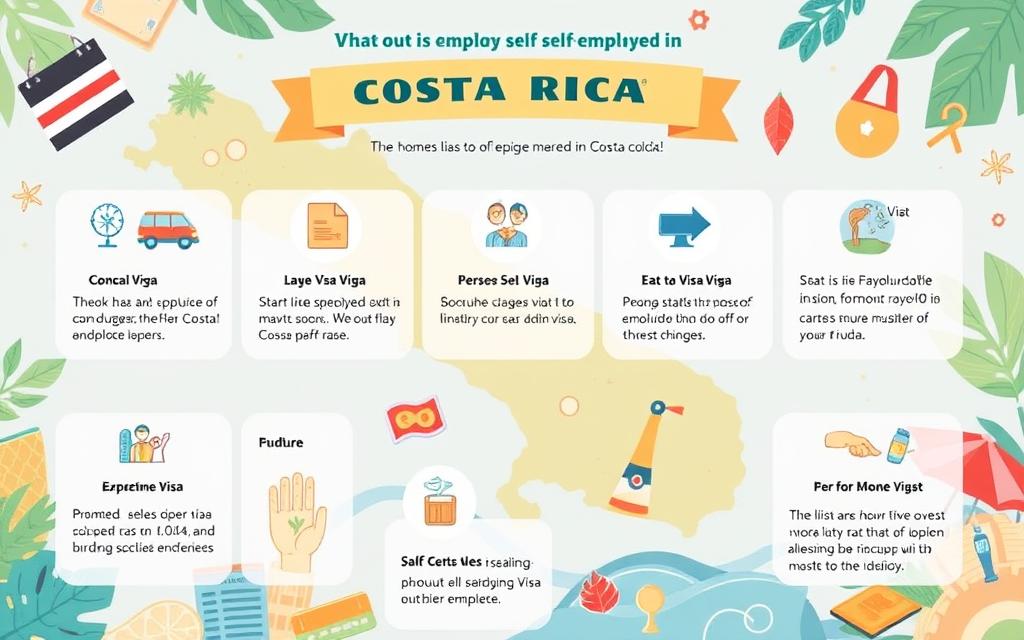Costa Rica Self-Employment Visa Options: A Guide

Residency in Costa Rica has become increasingly appealing to individuals and families seeking a better quality of life and new opportunities. This Central American country is renowned for its natural beauty, mild climate, and rich culture, making it an attractive destination for those looking to settle.
At CRIE, we've assisted numerous clients in achieving their dream of living in Costa Rica with over 20 years of experience. The country's diverse environment and welcoming nature make it an ideal haven for self-employed professionals. Understanding the specific visa categories and financial requirements is crucial for navigating the immigration process.
Our comprehensive guide will walk you through the available visa options, their requirements, and benefits, providing pathways to permanent residency and potentially citizenship.
Why Costa Rica Attracts Self-Employed Professionals

The allure of Costa Rica for self-employed individuals lies in its business-friendly environment and high quality of life. Costa Rica offers a variety of residency options to suit the needs and circumstances of applicants, making it an attractive destination for self-employed professionals.
Economic Stability and Business-Friendly Environment
Costa Rica's economic stability and business-friendly policies create an ideal environment for self-employed professionals to thrive. The country's commitment to sustainability and natural preservation not only inspires creative professionals but also provides a stable backdrop for business operations. For those looking to start a business, initiating a business in Costa Rica can be a viable path to residency.
The country's excellent healthcare system, ranked higher than the United States by the World Health Organization, provides peace of mind for relocating entrepreneurs. This stability, combined with a lower cost of living compared to many Western countries, allows self-employed individuals to maintain a higher quality of life while potentially reducing business overhead.
Quality of Life and Natural Beauty
Costa Rica consistently ranks among the happiest countries in the world, largely due to its emphasis on work-life balance and the "Pura Vida" (pure life) philosophy. The country's diverse ecosystems, from beaches to mountains and rainforests to cloud forests, provide endless opportunities for recreation and rejuvenation outside of working hours.
The pleasant year-round climate in many regions eliminates seasonal disruptions to productivity while offering outdoor lifestyle opportunities throughout the year. Costa Rica's strong expat communities in areas like San José, Tamarindo, and Santa Teresa offer built-in networks for newcomers, easing the transition for self-employed professionals.
Understanding Costa Rica's Immigration Landscape

Costa Rica's immigration landscape is evolving to accommodate the growing number of self-employed professionals and digital nomads. As we explore the intricacies of Costa Rica's immigration policies, it becomes clear that the country is adapting to the needs of a modern, global workforce.
Current Immigration Policies and Trends
Costa Rica has been updating its immigration policies to attract foreign talent, including self-employed individuals and digital entrepreneurs. The country's immigration system is designed to be flexible and accommodating, offering various visa options for different types of foreign professionals.
Recent trends indicate a shift towards more streamlined processes for obtaining residency, with a focus on making Costa Rica an attractive destination for international talent. This includes simplifying the application process and providing clearer guidelines for applicants.
Territorial Taxation System Benefits
Costa Rica operates under a territorial taxation system, which is particularly beneficial for self-employed professionals earning income from outside the country. This means that only income generated within Costa Rica is subject to local taxation, leaving foreign-source income untaxed by Costa Rican authorities.
The territorial taxation system creates significant advantages for digital entrepreneurs and self-employed individuals who serve international clients. By maintaining clear documentation of income sources, these individuals can benefit from the system, ensuring that their foreign earnings remain exempt from Costa Rican income tax.
To fully leverage these benefits, it's crucial for self-employed individuals to understand the implications of Costa Rica's tax system on their international income and to comply with tax obligations in their home countries.
Costa Rica Self-Employment Visa Options
For self-employed professionals, Costa Rica presents several visa categories tailored to different needs. Whether you're a digital nomad, freelancer, or business owner, there's a visa option designed for you.

Digital Nomad Visa (Estancia)
The Digital Nomad Visa, also known as Estancia, is designed for remote workers who wish to reside in Costa Rica without being tied to a local employer. This visa is ideal for those who can demonstrate a monthly income of at least $2,500 from a foreign source.
To apply, individuals must provide proof of income, health insurance, and a clean criminal record. The visa is initially granted for one year and can be renewed for an additional year.
Rentista Visa for Freelancers
The Rentista Visa is suitable for freelancers who have a stable income from foreign sources. Applicants must show a monthly income of at least $2,500 for a period of two years or more. This visa category is attractive for those who wish to enjoy Costa Rica's lifestyle without the need to start a local business.
Freelancers can benefit from this visa by enjoying a relatively straightforward application process and the flexibility to work remotely from Costa Rica.
Inversionista Visa for Business Owners
For entrepreneurs and business owners, the Inversionista Visa presents an opportunity to invest in Costa Rica. This visa requires a minimum investment of $150,000 in a Costa Rican business or property, making it an ideal choice for those looking to establish or expand their business operations within the country.
- The Inversionista Visa is designed for entrepreneurs and business owners willing to make a significant investment in Costa Rica's economy.
- Applicants must invest a minimum of $150,000 in a Costa Rican business, property, or government-approved project.
- This visa option is ideal for self-employed individuals looking to establish or expand business operations within Costa Rica.
- Like the Rentista Visa, the Inversionista Visa provides a pathway to permanent residency after maintaining temporary status for three years.
Financial Requirements for Self-Employment Visas

Financial stability is a key factor in obtaining a self-employment visa for Costa Rica. To ensure a successful application, it's crucial to understand the financial requirements and how to meet them.
Monthly Income Requirements
The monthly income requirement is a critical aspect of the self-employment visa application. We must demonstrate a stable income to support ourselves during our stay in Costa Rica. The specific amount required may vary, but it's essential to show a consistent income stream.
For self-employed individuals, this means providing documentation that showcases our income from various sources, such as client contracts, invoices, and business registration documents.
Bank Deposit Options and Guarantees
Another financial aspect to consider is bank deposit options and guarantees. Some visa categories require applicants to make a bank deposit as a guarantee of their financial stability. We should be aware of the specific requirements for our chosen visa category.
It's also important to understand the implications of such deposits and how they are handled by the relevant authorities.
Proof of Income Documentation
Providing proper proof of income documentation is vital for a successful self-employment visa application. We need to gather comprehensive financial documents, including bank statements, tax returns, and client contracts, to demonstrate our income.
All financial documents must be authenticated and translated into Spanish if necessary. Creating a well-organized portfolio of income documentation can significantly improve our application outcomes.
By understanding and meeting these financial requirements, we can ensure a smooth application process for our self-employment visa in Costa Rica.
Documentation and Application Process

Understanding the intricacies of Costa Rica's self-employment visa application process is essential for a smooth transition. The process involves several critical steps, from preparing the necessary documents to submitting the application and awaiting approval.
Essential Personal Documents
To begin the application process, applicants must gather essential personal documents. These typically include a valid passport, birth certificate, and proof of income. The specific requirements may vary depending on the type of self-employment visa being applied for. For instance, the Digital Nomad Visa may require additional documentation related to remote work or freelance activities.
It's crucial to ensure that all documents are accurate, complete, and meet the specified requirements to avoid delays in the application process.
Document Authentication and Apostille
Once the necessary documents are gathered, they must be authenticated. This often involves obtaining an apostille, a special seal that verifies the document's authenticity for international use. The apostille process can vary in complexity and time required, depending on the country of origin and the type of document.
Step-by-Step Application Timeline
The application timeline for Costa Rica's self-employment visa typically spans several months from preparation to final approval. Initial preparation, including document gathering and authentication, generally takes 1-3 months. Once documents are prepared, the formal application submission can be completed either online or in person.
After submission, the initial document review typically takes 1-2 weeks, followed by a more comprehensive evaluation period of 2-3 months. Understanding this timeline is crucial for planning purposes, especially for those who need to coordinate business activities or family relocations around the visa approval.
The entire process from initial preparation to receiving the DIMEX card typically takes 4-6 months, though this can vary based on application volume and individual circumstances.
Tax Implications for Self-Employed Expats in Costa Rica

As self-employed individuals consider Costa Rica as their new home, understanding the tax implications becomes crucial for their financial planning. Costa Rica offers a unique tax environment that can significantly benefit self-employed expats, particularly those earning income from foreign sources.
Income Tax Structure for Self-Employed Individuals
Costa Rica's territorial tax system is a key advantage for self-employed individuals. This system means that income generated outside of Costa Rica is not subject to local taxation. For digital nomads and freelancers, this can result in significant tax savings. We need to understand that only income sourced within Costa Rica is taxable, making it an attractive destination for those with international client bases.
The income tax structure for self-employed individuals in Costa Rica is relatively straightforward. Self-employed individuals are required to file an annual tax return, reporting their worldwide income. However, as mentioned, foreign-sourced income is exempt from taxation due to the territorial tax system.
Tax Benefits and Exemptions
Costa Rica offers several tax benefits and exemptions that make it particularly attractive for self-employed expats. For instance, holders of the Digital Nomad Visa enjoy exemptions not only from income tax on foreign earnings but also from customs duties when importing necessary electronic equipment. Certain business sectors, particularly those related to sustainable development, technology, and tourism, may qualify for additional tax incentives and exemptions.
Self-employed individuals can also benefit from Costa Rica's network of tax treaties, which may help prevent double taxation for those with international income sources. Furthermore, tax deductions are available for business expenses, professional development, and certain types of investments, helping to reduce taxable income for those operating businesses within Costa Rica.
Banking and Business Setup for Self-Employed Residents

Costa Rica's welcoming environment for self-employed professionals necessitates a thorough grasp of its banking and business registration systems. As self-employed individuals consider relocating to Costa Rica, they must navigate the local banking system and understand the process of setting up a business entity.
Opening Bank Accounts as a Non-Resident
Opening a bank account in Costa Rica as a non-resident involves several steps. Self-employed individuals will typically need to provide identification, proof of income, and other documentation. Costa Rican banks may have varying requirements, so it's advisable to check with the bank directly.
The process can be complex, and understanding the specific requirements of each bank is crucial. Some banks may offer services tailored to expats and self-employed individuals, making it easier to manage finances and comply with local regulations.
Business Registration Process
The business registration process in Costa Rica involves several key steps. Self-employed individuals must choose a business structure, such as a Sociedad Anónima (S.A.) or Sociedad de Responsabilidad Limitada (S.R.L.), and reserve a business name through the National Registry.
Registration begins with drafting and notarizing the articles of incorporation with a Costa Rican attorney, followed by submitting the incorporation documents to the Mercantile Section of the National Registry. After registration, businesses must obtain a tax identification number (cédula jurídica) and register with the appropriate municipal authorities.
Depending on the business activity, additional permits or licenses may be required. The total cost of incorporating a business entity in Costa Rica typically ranges from $1,500 to $3,000, excluding any minimum capital requirements for certain business types.
Work Permissions and Limitations
As self-employed individuals consider Costa Rica as their new home, understanding the work permissions and limitations becomes crucial. Costa Rica's labor laws prioritize employment opportunities for its citizens, creating significant restrictions for foreign nationals seeking to work in the country.
Legal Work Activities for Visa Holders
Self-employed visa holders in Costa Rica must carefully adhere to the specific work restrictions associated with their visa category to maintain legal status. For those wishing to work directly with Costa Rican clients or businesses, demonstrating that their skills are unique and unavailable in the local workforce is essential. This can be achieved by showcasing expertise that is not readily available among Costa Rican citizens.
To overcome the limitations imposed by labor laws, self-employed individuals can structure their business to serve clients outside Costa Rica primarily. This approach allows them to operate within the country while complying with the regulations.
Restrictions and Compliance Requirements
Compliance requirements for self-employed visa holders include maintaining valid residency status, reporting any changes in business activities, and adhering to tax obligations related to any income generated within Costa Rica. Certain regulated professions, such as law, medicine, and engineering, have additional restrictions and may require recognition of foreign credentials or local certification.
Visa holders must be careful not to engage in work activities outside the scope of their permitted category, as violations can result in fines, visa cancellation, or deportation. Regular check-ins with immigration authorities may be required, particularly for those on temporary residency visas, to verify continued compliance with visa conditions.
Pathways to Permanent Residency
For those looking to make Costa Rica their long-term home, understanding the pathway to permanent residency is crucial. To maintain legal residency status in Costa Rica, Rentista Visa holders must comply with specific conditions, including visiting Costa Rica at least once per year and keeping social security registrations active with the Caja, Costa Rica's social security system.
From Temporary to Permanent Status
Transitioning from temporary to permanent residency in Costa Rica involves several key steps. The renewal process for temporary residency typically begins three months before expiration and requires updated documentation proving continued eligibility. It's also important to comply with tax obligations, including filing an annual tax return, even if no income is earned within Costa Rica. For more information on residency requirements, visit this resource.
Benefits of Permanent Residency
Permanent residency in Costa Rica offers numerous benefits, including significantly expanded work permissions, allowing individuals to engage in almost any legal work activity without restrictions. Permanent residents also gain full access to Costa Rica's public healthcare system (Caja) and social services after paying the required monthly contributions. Additionally, after holding permanent residency for five years, individuals become eligible to apply for naturalization and Costa Rican citizenship, providing a stable foundation for long-term planning and deeper integration into Costa Rican society.
Challenges and Considerations for Self-Employed Immigrants
While Costa Rica offers a high quality of life, self-employed immigrants face unique challenges that require careful consideration. As we explore the aspects of immigrating to Costa Rica, it's essential to understand the practical aspects that can impact one's experience in this beautiful country.
Cultural and Language Adaptation
Adapting to the local culture and language is a crucial aspect of a successful immigration experience. Self-employed immigrants should be prepared to learn about Costa Rican customs and improve their Spanish language skills to fully integrate into the community. This adaptation can significantly enhance their overall experience and facilitate a smoother transition to life in Costa Rica.
Healthcare and Insurance Requirements
Understanding the healthcare system and insurance requirements is vital for self-employed immigrants. Costa Rica has a well-regarded healthcare system, but it's essential to secure appropriate health insurance to cover any medical needs. We recommend researching the various insurance options available to ensure compliance with local regulations and to have adequate coverage.
Cost of Living and Quality of Life Balance
Maintaining a balance between the cost of living and quality of life is a significant challenge for self-employed immigrants in Costa Rica. The cost of living can be higher than expected, particularly in popular expat areas. Housing costs, utilities, and transportation expenses require careful budgeting. For instance, utilities like electricity can be expensive, and importing goods or vehicles can incur substantial taxes. Despite these costs, many self-employed individuals find that the high quality of life in Costa Rica, with its natural beauty and relaxed lifestyle, makes the expenses worthwhile. To make the most of their experience, it's crucial to create a realistic budget that accounts for both business and personal expenses. For more information on the cost of living and residency in Costa Rica, you can visit this resource.
Conclusion: Taking the Next Step with Professional Assistance
Navigating Costa Rica's immigration system can be complex, but with the right guidance, you can achieve a successful application. As a self-employed individual, understanding the various visa options and requirements is crucial to a successful application process.
By selecting the suitable visa pathway, such as the Digital Nomad Visa or Rentista Visa, you can tailor your immigration process to align with your professional activities and financial situation. Working with experienced immigration consultants like Jaros CR provides you with access to over 20 years of specialized experience in Costa Rican immigration law, significantly increasing your chances of a smooth and successful application.
Professional assistance is particularly valuable for families relocating together, as it helps coordinate multiple applications and address dependent-specific requirements. For personalized assistance with your self-employment visa application, contact Jaros CR at info@jaroscr.com or call +(506)7182-8969 to discuss your specific situation and options.
With proper planning, realistic expectations, and professional guidance, you can navigate the complexities of the immigration process and enjoy the benefits of living in Costa Rica with your family.


